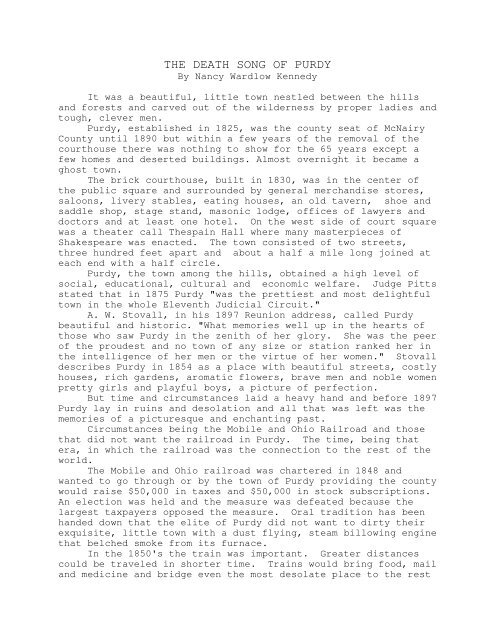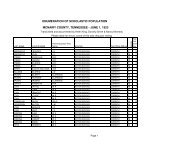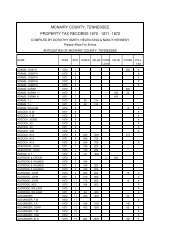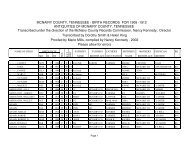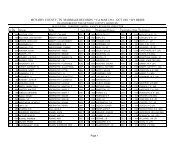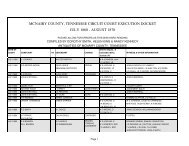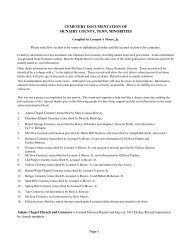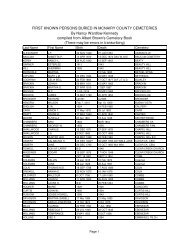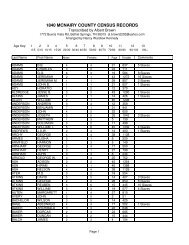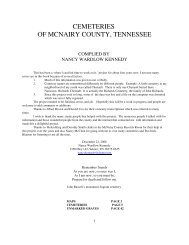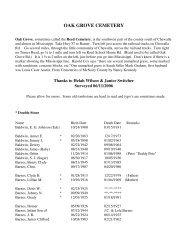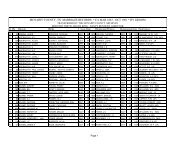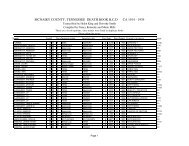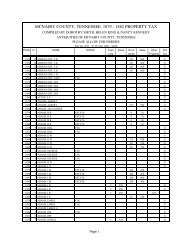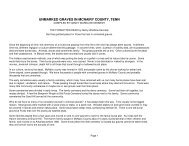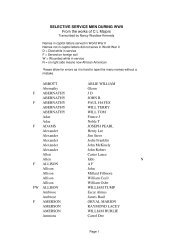Death Song of Purdy - McNairy, Life & Times of McNairy County, TN ...
Death Song of Purdy - McNairy, Life & Times of McNairy County, TN ...
Death Song of Purdy - McNairy, Life & Times of McNairy County, TN ...
Create successful ePaper yourself
Turn your PDF publications into a flip-book with our unique Google optimized e-Paper software.
THE DEATH SONG OF PURDY<br />
By Nancy Wardlow Kennedy<br />
It was a beautiful, little town nestled between the hills<br />
and forests and carved out <strong>of</strong> the wilderness by proper ladies and<br />
tough, clever men.<br />
<strong>Purdy</strong>, established in 1825, was the county seat <strong>of</strong> <strong>McNairy</strong><br />
<strong>County</strong> until 1890 but within a few years <strong>of</strong> the removal <strong>of</strong> the<br />
courthouse there was nothing to show for the 65 years except a<br />
few homes and deserted buildings. Almost overnight it became a<br />
ghost town.<br />
The brick courthouse, built in 1830, was in the center <strong>of</strong><br />
the public square and surrounded by general merchandise stores,<br />
saloons, livery stables, eating houses, an old tavern, shoe and<br />
saddle shop, stage stand, masonic lodge, <strong>of</strong>fices <strong>of</strong> lawyers and<br />
doctors and at least one hotel. On the west side <strong>of</strong> court square<br />
was a theater call Thespain Hall where many masterpieces <strong>of</strong><br />
Shakespeare was enacted. The town consisted <strong>of</strong> two streets,<br />
three hundred feet apart and about a half a mile long joined at<br />
each end with a half circle.<br />
<strong>Purdy</strong>, the town among the hills, obtained a high level <strong>of</strong><br />
social, educational, cultural and economic welfare. Judge Pitts<br />
stated that in 1875 <strong>Purdy</strong> "was the prettiest and most delightful<br />
town in the whole Eleventh Judicial Circuit."<br />
A. W. Stovall, in his 1897 Reunion address, called <strong>Purdy</strong><br />
beautiful and historic. "What memories well up in the hearts <strong>of</strong><br />
those who saw <strong>Purdy</strong> in the zenith <strong>of</strong> her glory. She was the peer<br />
<strong>of</strong> the proudest and no town <strong>of</strong> any size or station ranked her in<br />
the intelligence <strong>of</strong> her men or the virtue <strong>of</strong> her women." Stovall<br />
describes <strong>Purdy</strong> in 1854 as a place with beautiful streets, costly<br />
houses, rich gardens, aromatic flowers, brave men and noble women<br />
pretty girls and playful boys, a picture <strong>of</strong> perfection.<br />
But time and circumstances laid a heavy hand and before 1897<br />
<strong>Purdy</strong> lay in ruins and desolation and all that was left was the<br />
memories <strong>of</strong> a picturesque and enchanting past.<br />
Circumstances being the Mobile and Ohio Railroad and those<br />
that did not want the railroad in <strong>Purdy</strong>. The time, being that<br />
era, in which the railroad was the connection to the rest <strong>of</strong> the<br />
world.<br />
The Mobile and Ohio railroad was chartered in 1848 and<br />
wanted to go through or by the town <strong>of</strong> <strong>Purdy</strong> providing the county<br />
would raise $50,000 in taxes and $50,000 in stock subscriptions.<br />
An election was held and the measure was defeated because the<br />
largest taxpayers opposed the measure. Oral tradition has been<br />
handed down that the elite <strong>of</strong> <strong>Purdy</strong> did not want to dirty their<br />
exquisite, little town with a dust flying, steam billowing engine<br />
that belched smoke from its furnace.<br />
In the 1850's the train was important. Greater distances<br />
could be traveled in shorter time. Trains would bring food, mail<br />
and medicine and bridge even the most desolate place to the rest
<strong>of</strong> the world. <strong>Purdy</strong>'s leaders, whoever they were, Judge Pitts<br />
named W. S. Wisdom, did not have the insight to see this and<br />
sealed their doom.<br />
In 1858 the railroad was built through <strong>McNairy</strong> <strong>County</strong> but<br />
about 4 miles west <strong>of</strong> <strong>Purdy</strong>. Soon people began to move along the<br />
railroad. Falcon was one <strong>of</strong> the first towns to be established on<br />
the new railroad. Others included Bethel Springs and Finger and<br />
<strong>McNairy</strong> in the northern part <strong>of</strong> the county and Guys and Ramer in<br />
the southern part.<br />
About fifty miles <strong>of</strong> rail tracked through <strong>McNairy</strong> <strong>County</strong> and<br />
the constant clackety clack put more than train wheels in motion.<br />
After the civil war, talk began <strong>of</strong> moving the county seat to a<br />
point on the railroad. Thus began a twenty year struggle and at<br />
least twelve attempts were made before a successful move to<br />
Selmer was made in 1891.<br />
Documentation on the early removal elections has not been<br />
found but during the 1870's feelings grew intense and the<br />
courthouse was burned in March 1881. Thereafter court was held<br />
in and old store building because the <strong>County</strong> Court refused to<br />
rebuild.<br />
Both Bethel Springs and Falcon rallied for the crowning<br />
glory <strong>of</strong> having the county seat. Both towns had been established<br />
on the railroad. Bethel Springs was located 4 miles west <strong>of</strong><br />
<strong>Purdy</strong> and Falcon was seven miles south <strong>of</strong> Bethel Springs.<br />
Bethel Springs had early visions. When the town was laid<br />
out in 1860 a court square was included. Even in 1887, sentiment<br />
was still strong and in the Tatum Addition (east <strong>of</strong> the railroad)<br />
another court square was laid out.<br />
Falcon was one <strong>of</strong> the first towns to be established on the M<br />
& O Railroad in 1858. 54 lots were laid <strong>of</strong>f and beautiful,<br />
mulberry trees adorned the streets. The town began to flourish<br />
in 1871 when several stores opened. (Falcon also died after the<br />
birth <strong>of</strong> Selmer.)<br />
In July 1881 a meeting was held at Falcon for the purpose <strong>of</strong><br />
organizing a campaign to remove the county seat to Falcon or to<br />
some other point on the M & O Railroad.<br />
Apparently this was not the first meeting or election<br />
because plans were to assure the question <strong>of</strong> removal would never<br />
come up again.<br />
In January 1884, being without a courthouse since 1881, the<br />
court ordered a committee to secure bids for a new courthouse at<br />
<strong>Purdy</strong>. Those on the committee were Moses Kirkpatrick, R. B.<br />
Turner, J. G. Combs, and J. P. Prince.<br />
At the July 1884 session the court awarded the contact to<br />
William P. George <strong>of</strong> Kentucky to build the courthouse at <strong>Purdy</strong><br />
for $10,873 and to be finished by December 1, 1884. This<br />
courthouse was never built. The contact was suspended at the<br />
October session.<br />
At this same quarterly court a group <strong>of</strong> citizens <strong>of</strong> Falcon<br />
agreed to build and donate a 60 x 40 foot, two story courthouse
at Falcon with four rooms on the first floor and walls two brick<br />
thick. These citizens consisted <strong>of</strong> L. J. M. Nelson, John Ray, J.<br />
J. Horn, Prather & Simpson (merchants) W. E. Darby, Erwin & Bro<br />
(merchants) F. P. Browder, H. C. Gooch, Josiah Jeans, W. H. Stone<br />
and W. E. Tedford.<br />
At this time the Court ordered W. D. Jopling, Sheriff to<br />
hold an election for the purpose <strong>of</strong> voting on the question <strong>of</strong><br />
removal from <strong>Purdy</strong> to Falcon to be held on Saturday August 23,<br />
1884. On October 6 the vote was counted as: 1921 for removal to<br />
Falcon and 560 against it. The Court declared that 1921 was two<br />
thirds <strong>of</strong> the qualified vote and declared removal to Falcon. The<br />
committee appointed to remove records and secure a building was<br />
J. L. Smith, W. H. Stone, W. J. Darby, John F. Gilmer and W. E.<br />
Atkins.<br />
There is no data recorded in the minutes <strong>of</strong> the <strong>McNairy</strong><br />
<strong>County</strong> Court from October 1884 through April 1885. From May 1885<br />
to May 1886 court was held at Falcon.<br />
Immediately, those opposing the removal obtained an<br />
injunction. Chancellor Nixon heard the case and his decision was<br />
in favor <strong>of</strong> <strong>Purdy</strong>, therefore no removal. The case was settled by<br />
a Supreme Court decision also in favor <strong>of</strong> <strong>Purdy</strong>. In June 1886 the<br />
county seat was back at <strong>Purdy</strong>.<br />
There was an election on August 21, 1886 to remove to Bethel<br />
Springs. No vote totals were recorded. Vote was for removal to<br />
Bethel Springs but apparently there were many ballots that just<br />
said "removal" instead <strong>of</strong> "removal to Bethel Springs" and it was<br />
unclear which way to count the ballots that just said "removal."<br />
The court voted as to whether the county seat had been moved from<br />
<strong>Purdy</strong> to Bethel Springs. Carried 5. Not carried 12.<br />
On April 4, 1887 the court ordered a survey made to<br />
ascertain the most suitable and available place on the Mobile &<br />
Ohio Railroad, as near as practicable to the center <strong>of</strong> the<br />
county. Those appointed to conduct this survey were R. W.<br />
Michie, <strong>County</strong> Surveyor and a representative from each district:<br />
John F. Gilmer, Cornelius Graham, J. T. Houston, Thomas J.<br />
Huggins, W. W. Stone, Asa Bell, M. Kirkpatrick, John Aldridge, J.<br />
H. Wright, John B. Jopling, J. P. Atkins, R. T. Beck, Lewis B.<br />
Carter, J. T. Barnhill, T. B. Cox, Sidney Plunk, J. A. Bishop and<br />
J. J. Parrish.<br />
The three sites considered were Bethel Springs, Falcon and<br />
Selmer. Selmer was declared the most suitable place near the<br />
center <strong>of</strong> the county and the election ordered for removal to<br />
Selmer (or New South as it was then known) for August 27, 1887<br />
failed.<br />
A meeting was attended by several thousand people on July 9,<br />
1887 (prior to the election for removal) to rally for removal to<br />
New South (now Selmer). At this time the town <strong>of</strong> New South was<br />
still a dream. The settlement in 1887 consisted <strong>of</strong> one small<br />
store, one residence and one sawmill.<br />
Moving the county seat to Selmer was conceived by P. H.
Thrasher. When Thrasher acquired the land where Selmer is now<br />
located he cleared the land, laid <strong>of</strong>f streets and numbered lots.<br />
The proposed town was called New South which afterwards was<br />
changed to Selmer because the post <strong>of</strong>fice department would not<br />
accept two words. A new application was submitted for the name<br />
Selma but the word was misspelled and was approved as Selmer.<br />
A second election was ordered and also failed. In April 1888<br />
a petition was presented to request the court to call election<br />
for removal to Bethel Springs. This petition failed by one vote.<br />
18 against and 17 for. Instead the court ordered an election for<br />
August 5 for removal to Selmer. No vote totals were recorded in<br />
the minutes but it did not receive the necessary vote for<br />
removal.<br />
Thrasher organized the <strong>McNairy</strong> <strong>County</strong> Real Estate and<br />
Investment Company in 1889, to which he deeded almost all the<br />
business property <strong>of</strong> the proposed town with the agreement that<br />
the company build a courthouse and deed it to the county. The<br />
money for the courthouse to come from the sale <strong>of</strong> the lots.<br />
Members <strong>of</strong> the company were: P. H. Thrasher, R. D. Anderson,<br />
John T. Warren, Samuel Chambers, A. C. Hamm, H. L. W. Lancaster,<br />
H. P. Wood and J. W. Purviance.<br />
After a petition filed by the <strong>McNairy</strong> <strong>County</strong> Real Estate and<br />
Development Company on behalf <strong>of</strong> the citizens <strong>of</strong> <strong>McNairy</strong> <strong>County</strong> a<br />
third election was held on July 26, 1890 and carried 2063 to<br />
563.<br />
G. D. McBee and other citizens <strong>of</strong> <strong>Purdy</strong> brought suit to<br />
declare the election void and prevent the move to Selmer and<br />
lost. Thus ending the twenty year struggle for removal and <strong>Purdy</strong><br />
withered and died. The <strong>County</strong> Court held its first session at the<br />
new county seat April 7, 1891.<br />
On June 16, 1891, ceremonies were held to lay the corner<br />
stone for the new courthouse. A large crowd <strong>of</strong> people gathered.<br />
There was music, speeches and a big picnic at the spring in the<br />
hollow north <strong>of</strong> town.<br />
Contents <strong>of</strong> the corner stone was: a list <strong>of</strong> the names <strong>of</strong> the<br />
Board <strong>of</strong> Directors <strong>of</strong> the <strong>McNairy</strong> <strong>County</strong> Real Estate and<br />
Development Company, a Holy Bible, a history <strong>of</strong> the Rose Creek<br />
Lodge, a list <strong>of</strong> the <strong>of</strong>ficers <strong>of</strong> said lodge in charge <strong>of</strong> the<br />
ceremonies <strong>of</strong> laying the corner stone, a list <strong>of</strong> county <strong>of</strong>ficers,<br />
a catalogue <strong>of</strong> Henderson Christian College, a lot <strong>of</strong> stamps <strong>of</strong><br />
various denominations, a section <strong>of</strong> the stake driven to mark the<br />
center <strong>of</strong> the county, a copy <strong>of</strong> the proceeding <strong>of</strong> the Grand Lodge<br />
<strong>of</strong> Tennessee for 1891, an arrow head taken from the skull <strong>of</strong> a<br />
Comanche Chief, a lot <strong>of</strong> coins bearing the date <strong>of</strong> the year 1891,<br />
a letter directed to who-ever may be Post Master at Rose Creek<br />
when --- the corner stone shall again see the light, a lot <strong>of</strong><br />
other relics and copy <strong>of</strong> the Pepper Box which was the first and<br />
only paper then being published in Selmer.
Election Dates and Returns<br />
Required 2/3 <strong>of</strong> qualified voters<br />
Date, Question, and Results, if found:<br />
Aug 1, 1877 point on M & O Railroad<br />
1585 for removal<br />
833 against<br />
August 1878 point on M & O Railroad<br />
1692 for removal<br />
727 no removal<br />
August 1879 Bethel Springs or Falcon<br />
Results not found<br />
July 4, 1881 From <strong>Purdy</strong><br />
2104 for removal<br />
430 no removal<br />
Nov 10, 1881 Select a Site<br />
Results not found<br />
Aug 23, 1884 To Falcon<br />
1921 for removal<br />
560 no removal<br />
1 to Bethel<br />
2 Sims Tatum's<br />
2 removal<br />
Oct 21, 1886 To Bethel Springs<br />
Results not found<br />
Aug 27, 1887 To Selmer<br />
1580 to Selmer<br />
489 no removal<br />
26 to Falcon<br />
1 to Center<br />
1 Forty Forks<br />
5 to Bethel<br />
3 to <strong>Purdy</strong><br />
124 removal<br />
Aug 5, 1888 To Selmer<br />
Results not found<br />
Failed<br />
July 16, 1890 To Selmer<br />
2063 to Selmer<br />
563 against
According to J. Louis Adams twelve election were held on the<br />
question <strong>of</strong> removal. The documentation for the other three<br />
elections have not been found.<br />
The constant question in all elections was what constituted<br />
a two-thirds majority <strong>of</strong> qualified voters. The complainants<br />
argued there was a difference between two-thirds <strong>of</strong> the total<br />
that voted and two-thirds <strong>of</strong> those qualified to vote. Another<br />
argument was a ballot that said only "removal" should be not<br />
counted and that the ballot should state removal to Selmer or<br />
Falcon or Bethel. In the July 16, 1890 election complainants<br />
argued that 431 ballots that said only "removal" should not be<br />
counted, that all ballots counted should say "removal to Selmer."<br />
They also contended that 2063 was not a two-thirds majority <strong>of</strong><br />
the 3,500 they could prove were entitled to vote.<br />
John A. Pitts represented the Complainants until the final<br />
case after the election <strong>of</strong> 1890 in which he represented the<br />
Defendants. Pitts was reported to have said he could have<br />
prevented the removal <strong>of</strong> the courthouse to Selmer just as he had<br />
prevented it to Bethel Springs and Falcon. The Complainants ran<br />
out money and he switched sides to those that wanted the court<br />
house moved.<br />
References:<br />
<strong>McNairy</strong> <strong>County</strong> Independent dated: April 25, 1924, Nov 18, 1938,<br />
Jun 18, 1886, Nov 25, 1938<br />
Old <strong>Purdy</strong> by J. Louis Adams<br />
Personal and Pr<strong>of</strong>essional Reminiscences <strong>of</strong> An Old Lawyer<br />
by John A. Pitts<br />
Town Plait <strong>of</strong> Bethel Springs<br />
Minutes <strong>of</strong> the <strong>McNairy</strong> <strong>County</strong> Court, various dates<br />
Historical Articles by J. C. Taylor, complied by Bill Wagoner


